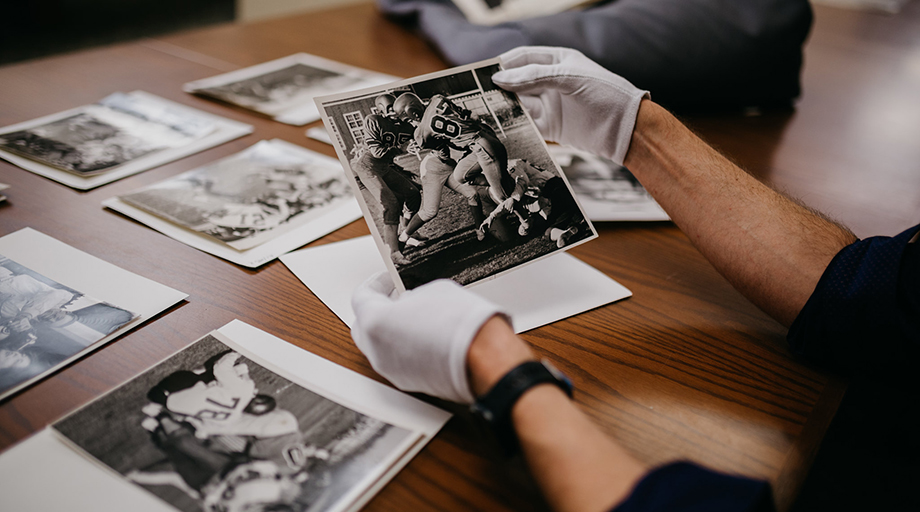This post was originally published by the University of British Columbia Library.

UBC Archives has received an extensive collection of materials from UBC’s Department of Athletics and Recreation, totalling nearly 8,000 photographs along with textual records like scrapbooks, posters, programs, team rosters, scoresheets, training schedules and other administrative documents from the athletics side of the department. The records span a century from approximately 1915 to 2015, and reflect the university’s rich sporting history, says archivist John Moran, who has been leading the archiving project for the last two years.
Previously stored at the War Memorial Gym—in rooms next to the old Empire Pool, which was prone to occasional flooding—the materials were moved to ensure their preservation in the Archives’ humidity-and temperature-controlled vault, and to accelerate the work of cataloguing the materials and identifying the athletes, faculty and staff captured in the photographs.
The project started in 2014 with the help of Katie Sloan, a UBC iSchool student and project archivist for the Department of Athletics & Recreation at the time. “She wrote up this amazing report on the conditions of the records and where they were located, and she created an inventory,” says Moran.
Unlike most of the materials accepted by UBC Archives, the records in this fonds are still in use today and quite popular. “The photographs are particularly amazing,” says Moran, and requests come in almost weekly from alumni and other community members looking for photographs of former teammates, friends and family members. “Now we’ve got the inventory made, so we can just search the name or team, and we can retrieve that photo. But before, the department would have to send some poor student down to go through thousands of photographs in the hope that they would find somebody.”
The Athletics archives were initially established by Douglas “Buzz” Moore, who “acted as an unofficial historian collecting records associated with UBC athletics achievements,” a responsibility that has since passed to UBC Athletics Historian Fred Hume.
“I started as a volunteer at UBC in the 1980s,” says Hume. “In 1989, the Director of Athletics at the time, Bob Hindmarch, asked me to create a hall of fame for UBC sports” which launched in 1993 as the UBC Sports Hall of Fame thanks to Hume’s diligent efforts in developing an induction selection process and digging deep into UBC’s athletics history. His encyclopedic knowledge of that history has also been an invaluable resource for Moran: “We’ve had this amazing help from Fred… who was going through the photographs ahead of me and was making note of anybody that he came across.”
When asked about their favourite discoveries from the fonds, Hume and Moran had several.
Moran highlights photos from the Tea-Cup Trophy, a charity football match that used to be held annually between students from the School of Nursing and Home Economics students (and later UBC Rehabilitation Sciences students), with half-time entertainment provided by UBC Engineering students. “You can see from the photographs, the games were intense,” he says.
Hume recalls an album that was compiled from photos taken during the UBC women’s basketball team’s trip to Prague, Czechoslovakia (now called the Czech Republic), for the 1930 Women’s World Championship in Prague, Czechoslovakia. It was a landmark game that almost didn’t happen.
The Edmonton Grads were meant to travel to Prague for the championship against France, after having won the Western final again UBC’s team: “But when it came time for this championship, the Edmonton Grads declined the invitation and recommended to the officials that the UBC women’s team represent Canada—in fact, represent North America, since the US didn’t send a team. So that’s what happened. The UBC women’s team raised some money and traveled by train across Canada, took a boat to England and went to Czechoslovakia for this basketball championship.” UBC played only one game, the final against the European champion team from France, which they won.
By safeguarding these materials and working to make them more accessible, the value of these photos and other materials can be shared with the UBC community.
Currently, UBC’s Department of Athletics and Recreation supports more than 25 varsity teams and 14 competitive sports clubs. Sports are unique, suggests Hume, in how they help shape a university’s identity, a person’s sense of pride in their university: “I think that a lot of alumni can identify with these teams, even if you weren’t on the team, and you were just a student at the time.”